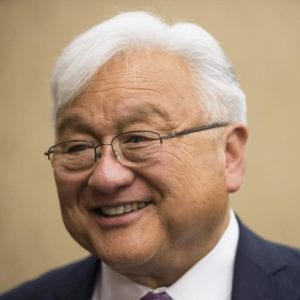WASHINGTON, D.C. — Former Congressman Mike Honda lost his seat to Rep. Ro Khanna in 2016 but that hasn’t stopped the longtime legislator from playing a role in politics.
Honda has stayed involved in politics over the past four years, supporting the Democratic party, working for immigrants’ rights and promoting other Asian American lawmakers.
In an interview with San José Spotlight, he shared some of his recent projects and ongoing goals.
Elections
Although he wasn’t running for office, Honda participated in the last two election cycles from the sidelines.

He supported two political action committees: Red to Blue helped Democrats gain more seats in Congress during the 2018 midterms, while Hold the House, which he launched, worked to maintain California’s Democratic majority in 2020.
“It was a good success,” he said.
Noting the divisive political landscape, Honda said he hopes all new or re-elected Democrats will work to reassure their conservative constituents.
“You have to work with the community who didn’t support you to let them know that you are still there to support them, and (that you view them) not as an enemy or an opponent, but as a constituent,” he explained.
California’s next senator
Vice President-elect Kamala Harris left an open Senate seat in California on her way to the White House, and Gov. Gavin Newsom chose Secretary of State Alex Padilla to fill it. He becomes the first Latino senator from the Golden State.
Honda was hoping an Asian-American would be tapped to take her spot.
“It’s just time to acknowledge that Asian Americans are part of the constituency in this state,” he said.
In a recent opinion piece for the San Francisco Chronicle, Honda called on Newsom to think about diversity when selecting a replacement for Harris. He noted California has a variety of talented Asian American officials, including State Treasurer Fiona Ma and Evan Low, a member of the State Assembly.
“He should ask himself, who’s not at the table?” Honda told San José Spotlight. “…We have a lot of folks in our population who are qualified, and they should be considered.”
Honda said he believed the Asian American community often has been left out of political discussions. He said politicians rarely even uttered the term “Asian Americans” until recently.
Being mentioned by name is important, he added.
“When they include us in the rhetoric, we exist,” Honda said.
Immigration
Now that the election is over, Honda has shifted his focus to immigration issues. He serves as co-chair for One Nation AAPI, an organization that promotes immigrants’ rights.
The group is working to reverse efforts by the Trump administration to alter the “public charge” rule. The rule prevents some immigrants from coming to the United States if they appear likely to be dependent on public assistance when they arrive.
Honda said the Trump administration has tried to expand the rule to block more immigrants, including those who are already legally residing in the United States, from ever seeking permanent residency if they have used any kind of public support.
“For immigrants who are already here, it makes them very nervous,” he said, explaining that many may have accepted some form of assistance and are now worried about being deported. “…When Joe Biden becomes president, we are going to be working with the Department of Homeland Security to ensure that we come up with a better definition (of public charge) and then pass a law that clarifies it.”
[optin-monster-shortcode id=”mc7dsaffrt6oqdqtfsob”]
During a White House briefing in August, Ken Cuccinelli, the acting director of U.S. Citizenship and Immigration Services, defended the policy change.
“Through the public charge rule, President Trump’s administration is reinforcing the ideals of self-sufficiency and personal responsibility, ensuring that immigrants are able to support themselves and become successful here in America,” he said. “This administration is promoting our shared history and encouraging the core values needed to make the American Dream a reality.”
Honda, however, argued it was just another attempt from the president to hinder immigration. The former congressman, who was sent to a Japanese American internment camp with his family in the 1940s, said he’s been dismayed by many of the Trump administration’s attempts to ramp up anti-immigrant sentiments.
But he’s also proud to see how many Americans have fought back.
“What Trump did with the Muslim ban, many rose up against it,” he said, adding that Americans said little when the Japanese were sent to camps during World War II. “…Times have changed, people are more educated. My hope is that we have learned a lot.”
Contact Katie King at [email protected] or follow @KatieKingCST on Twitter.



Leave a Reply
You must be logged in to post a comment.